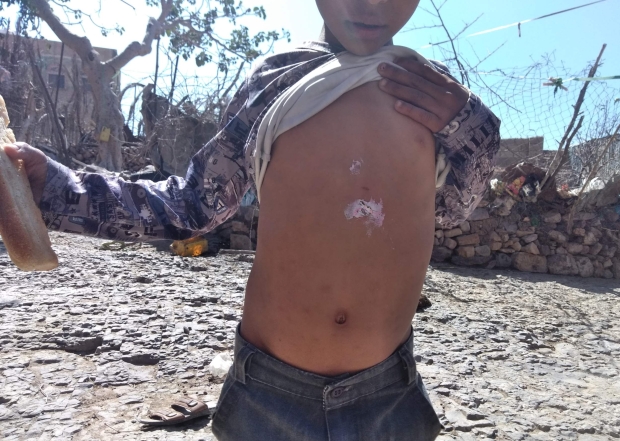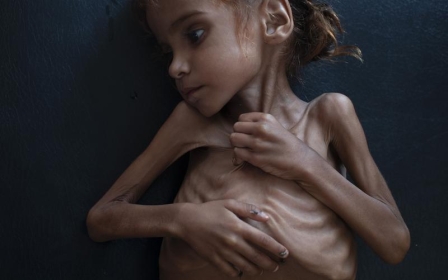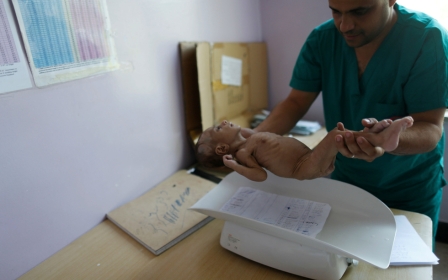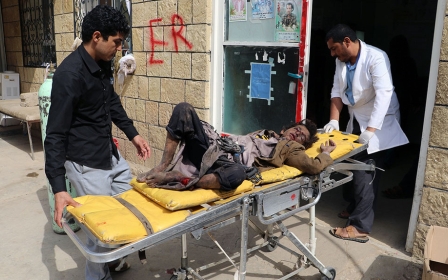Engraved in the flesh: Desperate Yemenis resort to branding for traumatised children
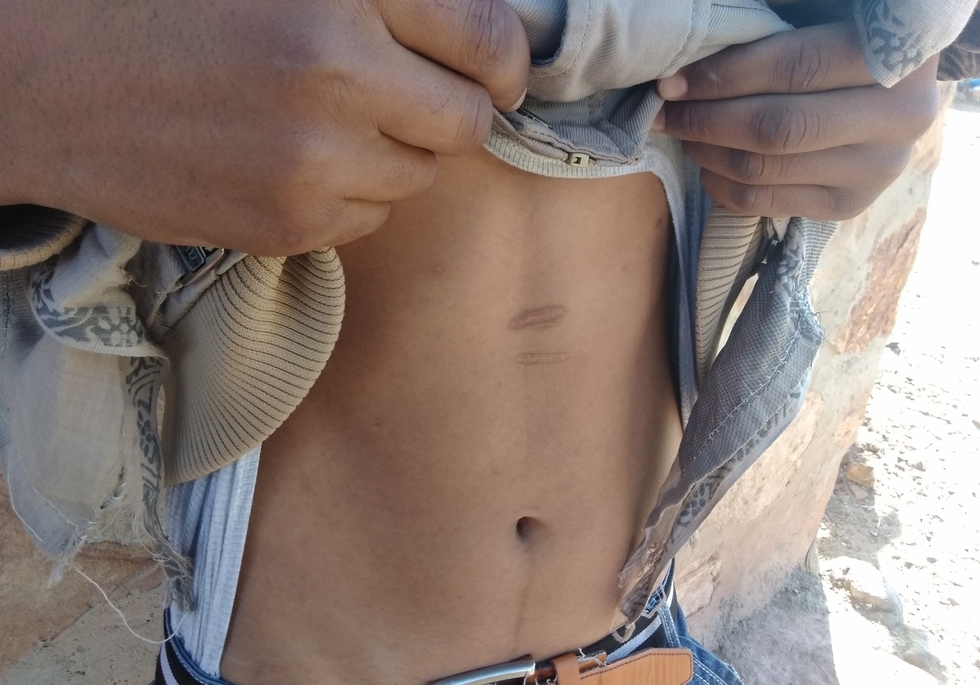
HODEIDAH, Yemen - Hana Absi was walking back home from school on 14 October when an air strike targeted a motorcycle near her on 7 July Street in Hodeidah.
Shrapnel exploded around the 12-year-old girl. Dead bodies lay around her, the vision seared in her memory. Overcome by the scene, Hana fainted.
"I saw a man and his child covered in blood near the school,” she told Middle East Eye. “Shrapnel nearly killed me. It reached all the way to the fence of the school."
Following the incident, the young girl from the Ghulail neighbourhood of Hodeidah began exhibiting symptoms of psychological trauma, and remained too afraid to go back to school, so close to where she had witnessed the deadly strike.
Walaa Absi, Hana’s mother, felt helpless faced with her daughter’s anguish. Her husband, a teacher in the western port city of Hodeidah, had not been paid in two years, and the family could barely afford to put food on the table - let alone move to a safer area or give Hana access to therapy.
Finally, Walaa said, she felt no choice but to go for “the last resort” - and mark her daughter with a hot iron
Finally, Walaa said, she felt no choice but to go for “the last resort” - and mark her daughter with a hot iron.
An old Arab saying goes: "The last cure is branding." But many needy Yemeni families have turned to branding with an iron in a desperate attempt to cure their children of physical illness and psychological trauma - marking the resurgence of a dangerous folk remedy as proper medical care has become increasingly inaccessible after four years of war.
A desperate measure
Following the air strike, Hana began to suffer from dizziness, insomnia, exhaustion and lack of appetite. At night, the girl lay awake in her bed, fearing that the battles she could hear raging some five kilometres away would soon reach her home.
"I stay up all night listening to the battles,” she said. “I feel they might kill us like the man and his child."
Walaa was desperate to find a solution for Hana.
"I tried to take my daughter to a hospital, but that would have cost me so much and we hardly find food to eat," Walaa told MEE. "After a week, I took my daughter to an old woman to get her branded.
"The old woman heated up a piece of iron until it became red, and then she put it on the belly of my daughter. Hana cried and I felt sinful,” Walaa recounted. "Then the old woman put toothpaste on the burning belly of my daughter to reduce the pain."
Walaa paid the old woman 1,000 Yemeni rials ($1.50), but Hana’s suffering had now become twofold - the psychological wounds left by the air strike, and the new, physical and mental pain of having been branded.
The old woman heated up a piece of iron until it became red, and then she put it on the belly of my daughter. Hana cried and I felt sinful
- Walaa Absi, Yemeni mother from Hodeidah
"I do not believe that branding is a kind of treatment, rather it is another suffering worse than the first, so children forget bad things and think only about the pain of branding," Walaa said.
Walaa soon found out that “dozens” of her neighbours had also put their children through similar treatment - trying to convince themselves that, in the absence of available alternatives, such a method was a good solution to their children’s ills.
After the branding, Hana regained a bit of appetite, began sleeping a little more, and stopped talking about the bloody victims of the air strike - but the deeper roots of her psychological trauma remain.
An ancient practice
Before access to doctors and hospitals became more widespread, branding was common in Yemen, especially in rural areas, where the method was used to treat chronic liver conditions or other diseases.
Umm Mohammed says dozens of people come to her home in Hodeidah every day to get branded - a treatment that, she believes, is more effective than anything else. The woman, who is in her eighties, said she learned the skill from her mother.
"In the past, there were no medicine or hospitals, only branding and there wasn’t a proliferation of diseases like today,” Umm Mohammed told MEE.
The elderly woman has a fire burning all day in her home, a red-hot iron ready for the next visitor. She says she can withstand the shouting and crying of the children, and binds any who try to wriggle free.
Branding takes around three minutes each, most often on the back, stomach, or, at times, the head.
"Branding is the cure of all diseases,” Umm Mohammed said. “Each disease requires branding on a specific area in the body.”
She said many people have come to her after hospital visits and other medical treatments failed, and claimed that all recovered after resorting to branding.
Nowadays, more and more Yemenis have come to her over psychological trauma, Umm Mohammed said, for which she prescribes a brand on the stomach.
"The war has left thousands of children - and even adults - suffering from trauma, so I try to help them by branding," she said.
Umm Mohammed said she does not ask for money from the poorest who come to her, only accepting payment from those who offer it.
"I do not take money from needy people. Only those who can pay me 500 or 1,000 rials ($0.75 to $1.50), I take from them to support my family," she said. "I also have family I need to support."
A dangerous choice
Sayaf Noori, eight, is another young Yemeni child who was left psychologically scarred after witnessing fighting in the al-Rabash neighbourhood of Hodeidah in July, when his family fled their home amid fierce clashes.
Since then, Sayaf have been suffering from trauma symptoms including insomnia and loss of appetite, and sometimes sees blood in his urine.
Too poor to take his son to the hospital while trying to support a family of seven children, Sayaf’s father Saleh took him to an old man to brand him.
But Sayaf’s condition has not improved since.
I do not believe that branding is a kind of treatment, rather it is another suffering worse than the first so children forget bad things and think only about the pain of branding
- Walaa Absi, Yemeni mother from Hodeidah
“My son has not recovered until now, and the most dangerous thing is that there is blood in his urine," Saleh told MEE.
"The old man told me to brand my son again in one month if he does not recover from the effects of the fear, and I will do it because I do not have another choice."
Yemeni doctors have denounced the growing popularity of branding, and believe it amounts to neglect from some parents when used as a substitute for specialised care.
"If there is blood in the urine, this means there is something wrong with the kidney or the urinary system of the child,” doctor Mustafa al-Haj told MEE. “He must visit a doctor or this could lead to death."
Walaa, Hana’s mother, stated that she and many other parents resorted to branding because they had no means to access any form of treatment.
"I hope that organisations provide our children with free treatment for psychological trauma and help us to leave towards safe areas," she said.
"I call out to organisations because they are the only ones that can help us nowadays. We have deprived our children of many rights because we live in conflict zones."
This article is available in French on Middle East Eye French edition.
New MEE newsletter: Jerusalem Dispatch
Sign up to get the latest insights and analysis on Israel-Palestine, alongside Turkey Unpacked and other MEE newsletters
Middle East Eye delivers independent and unrivalled coverage and analysis of the Middle East, North Africa and beyond. To learn more about republishing this content and the associated fees, please fill out this form. More about MEE can be found here.


